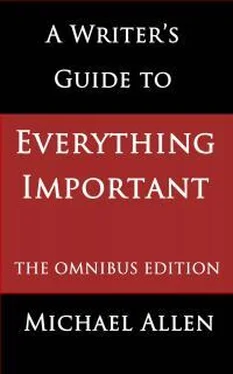The Wylie experiment was the first cunning plan to try to rescue the finances of literary agencies, but it was not to be the last.
Other agencies were also experiencing lower sales figures for previously published books (because of the ebook competition); and they simultaneously found that lower advances were being offered for contracts with new writers. So those agencies also began to look at digital publishing.
To cut along story short, at the time of writing (early 2014), about 25 agents have arranged to offer ebook publication to their clients through an arrangement with a canny group of entrepreneurs operating under the name Argo Navis.
Argo Navis is a company which enables agencies to insert themselves, in true agently fashion, in between the writer who wants to self-publish, and the reader. And thereby claim their 15%.
Argo Navis works only with agents. An individual writer cannot approach them himself (should he be foolish enough to want to). However, if an agent has a client who wishes, in effect, to self-publish a book (probably because it can’t be sold as a print book), then the agent can propose the book to Argo Navis.
Subject, one assumes, to some quality checks, Argo Navis will then create an ebook, suitably formatted, and will act as a distributor of that book to various ebook retailers, such as Amazon, Barnes & Noble, Apple.
Should the book require some professional polish before being ready for market (and instinct tells me that it probably will), Argo Navis can offer editing, cover designs, and formatting services. For a price.
In return for the distribution service for the finished ebook, Argo Navis takes 30% of what’s left after the retailer has taken the first slice (which is often 30% of the sale price). Agents will then take 15% of the remainder. For ever. Which of course they have fully earned simply by contacting Argo Navis in the first place, with the suggestion that the book might fit the bill.
That, at any rate, is the way this system seems to work at the time of writing. It is being marketed as ‘agent-curated self-publishing’, and some of the biggest names in the agency business are publicly associated with it.
I dare say that there are, somewhere, some professional writers who think that this is a wonderful scheme, fair to everybody, and an effective way to connect writers with readers. But I must add that most of the professional writers who have made their views known in public media, such as blogs, have greeted this scheme with contempt and suspicion. Furthermore, sales through Argo Navis are reportedly poor: perhaps one copy a month.
I note, in closing this section, that there are experienced observers who think that any attempt on the part of agents to get into the publishing business at all constitutes a breach of agency law. The agents’ job is to represent writers in negotiations with third parties, not to publish the stuff themselves, even through Argo Navis, and especially not if it’s all done on germs which leave only a slim cut to the writers.
It may save you time if I say once again that, so far as I am aware, none of these agent-operated ebook publishing arrangements do anything for you that you cannot do for yourself, free of charge; you just have to take a few hours to train yourself in how to do it.
I have published over 60 ebooks so far, and the more you do the easier it gets. I design all my own covers and act as my own editor. So the cost to me of 60+ ebooks, so far, has been zero.
4.6.7 Geese for plucking
There may have been times, while reading this fascinating saga, when you came to the conclusion that I might, just possibly, be a tad cynical.
Ha! If only you knew. The great irony of my life is that I have always been considered a cynic, from schooldays onwards. But the truth is that I have always been naïve. I have seldom been able to see through the dishonest ploys of others. And so it remains today. If I seem to be laying on the dark warnings with a heavy hand, try reading what some others have to say. Experienced judges at that.
Kristine Kathryn Rusch: ‘Agents are trying to save their jobs, and, unfortunately, many of them are willing to do so on the back of the writers they represent.’
David Vandagriff ,explaining why vanity publishers are not noticeably worse than traditional publishers: ‘Each side reflects the same attitude toward authors – geese to be plucked.’
PART 5: Do you really need an agent?
5.1 The problem of finding readers
In the twenty-first century, a writer’s problem is this: How can I best find readers? And preferably, of course, readers who will pay a sensible sum for reading my work. Do I really need an agent to achieve that?
Generally speaking, I would say you don’t.
If you’ve read religiously through this ebook – or even if you’ve just scanned it – you will have noticed that there are plenty of writers who have had bad experiences with agents. We tend to hear from them. The satisfied clients (and there must be some, somewhere) tend to be too busy writing books to say anything in public.
But just consider: Twenty years ago, it was well nigh impossible to get a traditional publisher to take any notice of you unless your work was submitted through an agent. A covering letter from an agent meant that the publisher had some vague guarantee that the book was of broadly publishable standard.
Then, there was no other way to get to readers. Either you went through a traditional publisher or, realistically, you had no chance of connecting with readers.
And then, along came the internet, digital printing technology, ecommerce, and all like hat. Everything changed.
Today there are clear and well defined ways for a novelist to find readers – readers, moreover, who will pay money for reading your book, provided it is sensibly presented and priced.
So you don’t, you really, really don’t, need an agent to get started as a writer.
Or to continue, actually.
But it is conceivable that, at a certain point in your writerly progress through life, you might find it useful and profitable to use an agent to sell foreign-language rights and audio rights; and, yes, even film rights. Maybe.
And I don’t think I’m going to say much more than that. But I will quote some other people’s views on the matter.
5.2 Some forthright views
I do think I need to stress to you that there are some experienced professional writers around, people with successful track records in traditional publishing, who are absolutely adamant that new writers should not go anywhere near an agent’s office. Cross the street and hurry on by, lest they drag you inside.
You don’t have to travel far on the internet to meet the anti-agents. Here, for a start, is Dean Wesley Smith. In a recent blog post he wrote as follows:
‘Are there reasons to have an agent in 2014? Nope. Not a one…. They will only get in your way.’
However, says Dean, if you insist on ignoring what he thinks, here are some further bits of advice, which you ignore at you peril.
‘Never sign an agency agreement…Never allow them to touch one penny of your money before you do…. Make sure that you can fire the agent on 30 days notice….’ And so on. And this, remember, from a man with 100 novels under his belt.
To balance up the genders, let me introduce Laura Resnick. Writing in 2013, Laura tells us that she has been making her living as a full-time novelist for 25 years. She is a hybrid – that is to say she currently self-publishes her backlist but continues to have a very satisfactory relationship with a traditional publisher for her new books.
On the question of agents, this is Laura’s view:
‘One of the common misconceptions still circulating… is that you need a literary agent for a career in traditional publishing. In my own experience (and in the experience of a growing number of other writers, too) this is a completely false, erroneous, and inaccurate assumption (though one heartily encouraged by most literary agents, for obvious reasons.’
Читать дальше












